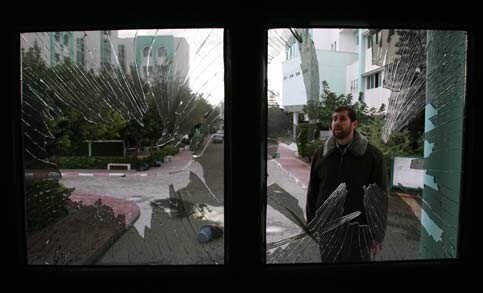IRIN 5 February 2007

A Palestinian man walks through a damaged building inside the Islamic University after it was attacked in Gaza City, February 3, 2007. (MaanImages/Wesam Saleh)
RAMALLAH, 4 Feb 2007 (IRIN) - Six United Nations agencies have warned that bloody street battles between rival Palestinian militant groups in the Gaza Strip are blocking the delivery of vital humanitarian aid to a vulnerable population.
Fierce fighting between Hamas, the party of government, and Fatah, the party of Palestinian President Mahmoud Abbas, forced the UN Relief and Works Agency (UNRWA), which looks after Palestinian refugees, to shut schools for some 35,000 children on Saturday and suspend food delivery from its Gaza city warehouse.
UNRWA provides food to 1.1 million of the 1.4 million people who live in the Strip.
“We cannot deliver humanitarian services in the crossfire. We have been warning repeatedly that the situation here was heading for a social explosion - now it has come,” said John Ging, UNRWA’s director of operations in Gaza.
In several days of fighting up until Saturday, 25 Palestinians had been killed and 245 injured in violence that has seen Fatah and Hamas use arms such as rocket-propelled grenades in attacks across the Gaza Strip. The deaths added to January’s total of 53 fatalities in clashes between the rival factions.
“It is becoming extremely difficult for us to fulfil our humanitarian mandates to alleviate the suffering of the Palestinian people. The implications of this for a population already facing extreme hardship are grave,” warned UN agencies including UNRWA, the UN Office for the Coordination of Humanitarian Affairs (OCHA) and UNICEF in a statement on Saturday.
“The upsurge of violence, which has taken the lives of innocent civilians is also putting our workers on the ground at serious risk,” the statement continued, adding, “We appeal to the parties to refrain from any action which endangers civilian life and which prevents us from fulfilling our humanitarian responsibilities.”
“We try to balance the risk of violence to kids and parents on one hand with the need for these kids to get an education on the other - but the intensity of the fighting was such that we had no choice,” said Ging of the decision to close UNRWA-run schools.
“Our food distribution work in Gaza City has been disrupted because we couldn’t get to our warehouse there,” he added.
Because the large numbers of wounded left hospitals short of blood, UNRWA used its vehicles to get through supplies, Ging said. A Red Cross fleet was used to ferry doctors and nurses safely to work, according to spokesman Marcin Monko, while ambulances had difficulty evacuating casualties from combat zones.
The fighting has left cities up and down the Gaza Strip deserted, according to Stuart Shepherd, OCHA’s humanitarian affairs officer in Gaza.
“It’s a ghost town at the moment. People who do venture out are being stopped at impromptu checkpoints manned by the militia groups. People are very afraid and they are choosing not to leave their homes,” he said.
Shepherd added that the current Palestinian fighting was posing a greater challenge to aid agencies than previous Israeli military incursions into Gaza because the fighting is spread throughout the Strip.
“When the Israelis went into Beit Hanoun, for example, it was terrible for the 30,000 people in the town but the rest of the Strip could go about their lives,” he said.
“This fighting is not localised and is more likely to affect our work - if we are moving about we can get caught in the crossfire or face being kidnapped.”
The UN currently has about six international staff working in Gaza for its various agencies, Shepherd said.
This item comes to you via IRIN, a UN humanitarian news and information service, but may not necessarily reflect the views of the United Nations or its agencies. All IRIN material may be reposted or reprinted free-of-charge; refer to the copyright page for conditions of use. IRIN is a project of the UN Office for the Coordination of Humanitarian Affairs.
Related Links